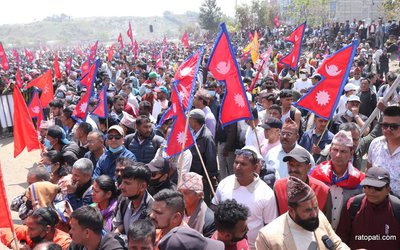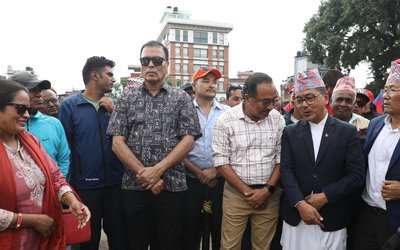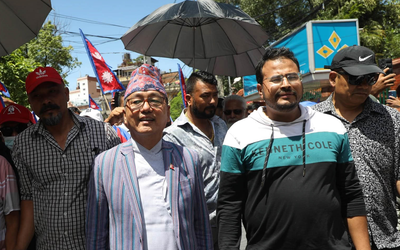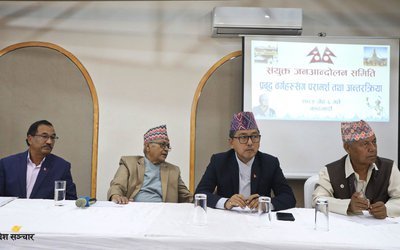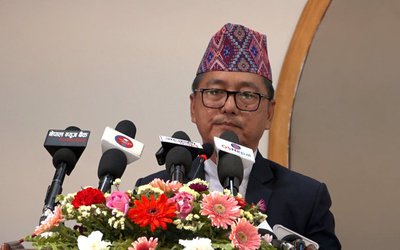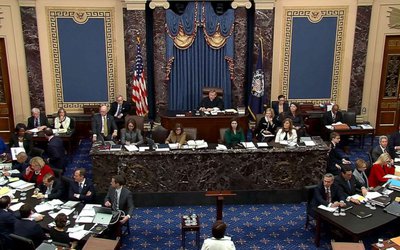“If Nepali Congress becomes a party of power hungry people and forgets the cause of patriotism, it will lose its relevance and utility in Nepali society. Nepali Congress will thrive in a situation where it champions the middle path with patriotism and democracy.”
What BP Koirala wrote in his book, 'Raja, Rastriyata and Rajniti', rings true in the present context in which Nepali Congress is completely siding with the power game, losing its own national identity.
At a time when an overwhelming number of Nepali Congress leaders and workers are enjoying the power game, championing the slogans of radical and populist ideologies, the championing of the National Reconciliation and party's core ideology is left to a small group of former party stalwarts.
As some party leaders are bargaining for power, former Nepali Congress stalwarts gathered at a party venue to remember their ideologue.
Although the leaders, who gathered at the program, were old and out of power, their spirit and commitment towards National Reconciliation and B.P. Koirala was strong. At the program organized by BP's Ideology National Society on the occasion of the 41st National Reconciliation and National Unity Day, speakers after speakers, from CA member and chair of the Society K.B.Gurung, to former minister and co-chair Govinda Raj Joshi, echoed the same language and same stand.
“Nepali Congress and BP’s national reconciliation cannot be separated. If the party gives up BP’s ideology, the party will lose its identity and image in the society and politics,” said Gurung. “The celebration of national reconciliation day reminds us of the glory of party’s commitment to democracy,” said Gurung, who returned to Nepal from exile a few days before Koirala did 41 years ago.
Propounded by BP Koirala, upon his return from a long exile in India, national reconciliation has been the basic foundation for the centrist party, Nepali Congress, for long. However, Nepali Congress, which is now under the leadership of Koirala’s former disciple Sher Bahadur Deuba, is now thriving in populist slogans while siding with the radical communists.
“Nepali Congress needs the line of BP Koirala, as the party is under his ideological influence. Even after 41 long years, what BP Koirala propounded on patriotism and nationalism is more relevant now than ever,” said Joshi. "On sharing power with radical communists, Nepali Congress has lost its own essence and identity.”
Joshi is right. When BP Koirala died in 1981, Nepali Congress was a major political party and no one could ignore its voice. However, now Nepali Congress is one of the parties needing an alliance with the communists and regional parties to be in power.
Forty-one years ago when senior Koirala returned from eight years of exile in India, Nepal was under autocratic Panchayat system and it was in the midst of a national crisis.
“Whatever the circumstances he faced, elder Koirala never compromised with his conviction on National Reconciliation and he dared to speak his conviction upholding the values of liberal democracy and nationalism. However, all his colleagues, including his own brother G.P. Koirala, sacrificed everything to go to power,” said Joshi.
“Nepali Congress is now completely derailed from its ideological track. We are neither the party of democrats nor the party of patriots,” said former minister Laxman Ghimire. "If we continue to follow the present path, we will completely lose our identity very soon.”
BP had a clear version. “If democracy and nationalism have to be saved, we cannot afford to give in to populism. To save democracy, we may at times have to take unpopular decisions and make the people accept them,” said BP Koirala in his interview to Indian journalist Bhola Chatterjee.
As BP Koirala always said Nepali Congress has lost its identity in giving up nationalism and democratic ideals. By launching the joint agitation with communists in 1990 against the traditional force of monarchy, Nepali Congress deviated from its ideology of reconciliation. In Janandolan II, under late GP’s leadership, Nepali Congress joined hands with violent Maoists against monarchy and liberal democracy. Even founding leader of Nepali Congress Krishna Prasad Bhattarai quit the party after this decision.
Despite declaring Nepal as a federal, democratic, secular republic, nothing has substantially changed. Nepal continues to face a series of political instability one after another.
As Nepali Congress is gradually proving itself as irrelevant after compromising its ideals, the popularity of its leader BP Koirala and his policy of national reconciliation is going higher.

Keshab Poudel
Poudel is the editor of New Spotlight Magazine.
- FOURTH PROFESSOR Y.N. KHANAL LECTURE: Nepal-China Relations
- Jun 23, 2025
- Colonel JP CROSS: Centenary Birthday
- Jun 23, 2025
- REEEP-GREEN: Empowering Communities with MEP
- Jun 16, 2025
- BEEN: Retrofitted For Green
- May 28, 2025
- GGGI has been promoting green growth in Nepal for a decade: Dr. Malle Fofana
- May 21, 2025
